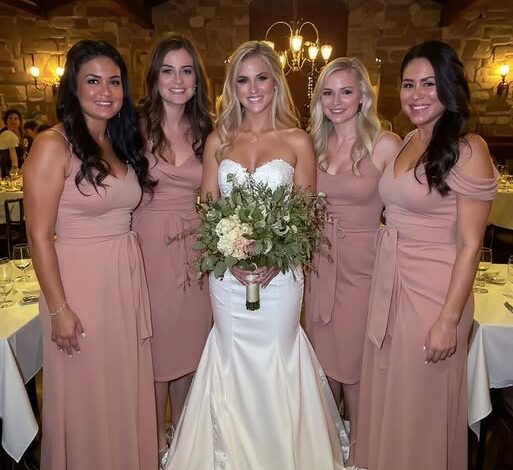
My Stepsister Asked Me to Sew Six Bridesmaid Dresses, Promised to Pay for the Materials and My Time, Then Claimed It Was Just a Wedding Gift
When my stepsister Nora asked me to sew six bridesmaid gowns for her wedding, I said yes against my better judgment. We’d never been especially close, but part of me thought maybe this was my chance to build a bridge. Besides, she promised to cover the cost of materials and pay me for my time. With a four-month-old baby at home and money tight, it sounded like a way to help family and ease our finances. But instead, it became one of the hardest lessons of my life.
The call came one Tuesday morning. I was balancing little Liam on my hip when Nora’s voice buzzed through the phone. “Eliza, I’m desperate. None of the shops have gowns that fit all my bridesmaids. You’re so good at sewing—could you make them? Please? I’ll pay you well.”
I hesitated. I hadn’t done major sewing since before Liam was born, and my days were already consumed with feedings, laundry, and exhaustion. But she insisted. “It’ll save my wedding. I promise you’ll be compensated.” Against my instincts, I agreed.
The work started immediately. Each bridesmaid had her own set of demands: Chloe wanted plunging necklines and tight waists, Lily wanted modest cuts and loose fits, Ava insisted on thigh-high slits and extra support. No two preferences matched. I adjusted patterns, remade sketches, and spent countless nights hunched over my machine while Liam cried in the background. More than once, Owen found me at 3 a.m., eyes bloodshot, surrounded by scraps of silk. He worried, and he had every right to. I’d already drained $400 from our baby savings on fabric and notions. Nora hadn’t paid me a dime upfront.
Three exhausting weeks later, the gowns were finished—six perfectly fitted, handmade dresses that looked like they belonged on a runway. I delivered them with a sense of pride mixed with desperation. Maybe now I’d finally see the gratitude she promised.
Instead, Nora barely looked up from her phone. “Just hang them in the spare room,” she said flatly. When I asked about payment, her face twisted in mock surprise. “Payment? Honey, this is your wedding gift! What else would you give me? A blender? A picture frame?”
Her words sliced through me. A “gift”? I’d sacrificed sleep, health, and money set aside for my baby’s clothes, and she brushed it off like it was nothing. When I pressed, she laughed. “You don’t even have a real job right now. I did you a favor keeping you busy.”
I drove home in tears, shoulders shaking so badly I could barely keep my hands on the wheel. Owen wanted to confront her, but I begged him not to. Starting a war days before the wedding felt unbearable.
At the ceremony, Nora glowed in her designer gown. But as I listened to guests marvel over the bridesmaids, I felt a flicker of pride. “Who made these dresses?” people whispered. “They’re incredible.” I caught Nora’s face tightening each time the attention drifted away from her. Later, I overheard her bragging to a friend: “They were basically free. My stepsister’s desperate for things to do. Some people are just easy to trick.” My blood boiled.
Then karma showed up. Minutes before her first dance, Nora pulled me into the restroom, panic written across her face. Her expensive gown had ripped wide open down the back seam. White lace underwear was all that stood between her and total humiliation. “Please, Eliza,” she begged, tears streaking her makeup. “You’re the only one who can fix this.”
I took my time. The irony wasn’t lost on me—her prized designer dress had failed, and the “unemployed” stepsister she’d mocked was the only one who could save her. I pulled out the emergency sewing kit I always carried, knelt on the dirty tile, and stitched it back together under the glow of my phone flashlight. Ten minutes later, she was whole again.
“Thank you,” she whispered with relief. She started to walk away, but I stopped her. “You owe me something—not money. Just the truth. Tell people who really made those gowns.”
She said nothing and left. I thought that was it.
But during her speech later that night, Nora surprised everyone. She stood, clutching the microphone, her voice trembling. “I owe my stepsister an apology. I asked her to make six gowns, promised to pay, and instead took advantage of her. She used her baby’s savings to buy materials, stayed up night after night sewing, and I dismissed her hard work. Tonight, when my dress ripped, she saved me. Even after everything. I don’t deserve her kindness, but I want to thank her.” She walked over and handed me an envelope. “This is what I owe, plus more for Liam. I’m sorry.”
The room erupted in applause. For me, the money was welcome, but it wasn’t the point. What mattered was being seen. For once, she admitted the truth.
That night I learned something important: standing up for your worth doesn’t always mean loud confrontations or revenge. Sometimes it means holding your dignity, showing what you’re capable of, and letting reality do the rest. Nora got her wake-up call. And I finally got the respect I deserved.




